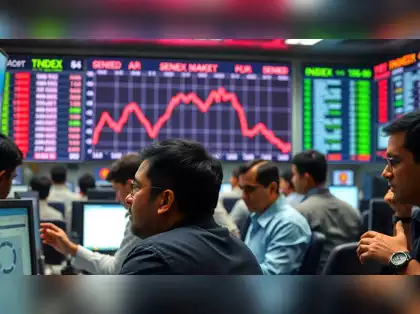Recently, US President Donald Trump imposed high tariffs on many countries, leading to big concerns in the stock markets all around the world. Many Wall Street experts are now worried that the US might fall into a recession, which is when the economy gets really bad.
Just last week, Trump introduced a 10% tax on goods coming from almost every country. This tax affects India by adding a 26% charge on exports to the US, while China and Vietnam are facing even higher tariffs. Although some of these taxes might be reduced through future talks, many on Wall Street believe they could strongly influence the economy and potentially lead to a downturn.
Goldman Sachs, a major investment firm, increased its odds of a US recession from 35% to 45% because of these tariffs. They are even considering lowering their forecasts if the tariffs stay long-term. Another big firm, JP Morgan, predicts that the US could face a recession by the end of 2025, estimating a 60% chance of this happening. Other banks like HSBC, Deutsche Bank, and BofA also share similar concerns.
If these tariffs remain, they could make everything more expensive. This might cause businesses to hesitate in hiring more workers, investing in technology, or exploring new markets. When prices go up, people tend to spend less money. After growing at 2.8% in 2024, the US economy might slow down or even shrink.
In the last 25 years, the US has faced three major recessions: in 2001, the economy shrank by 0.6%; in 2008, it dropped by 4.3%; and in 2020, it fell by 3.4%. These downturns didn’t just hit the US hard; they also affected global markets and trade.
India’s economy is mostly based on its own people, with strong growth predicted at 6% for the next financial year. However, it’s still connected to global supply chains, which means a US recession could have negative effects, especially on the stock markets in India. If the US economy weakens, foreign investors might pull their money out of India, leading to falling stock prices and more market swings. IT companies in India, which rely on the US, could also struggle.
The historical data shows that during past US recessions, India’s stock market (Sensex) fell significantly—by 18% in 2001 and by a huge 52% in 2008. Even during the Covid pandemic, there was a massive sell-off but a quick recovery later brought the index back up by 15%.
Still, some analysts believe Indian markets are doing pretty well, despite the challenges. They point out that India has strong economic fundamentals, with steady growth expected. This means India might handle global problems better than others.
So, how can investors manage this situation? Experts suggest staying calm, not panicking, continuing regular investments (like systematic investment plans or SIPs), and looking for good stocks at lower prices. They recommend checking investment portfolios and making sure to have a mix of different investments.
This period could be an opportunity to buy strong companies, as the current drops are more about tariffs than actual bad business situations.





Leave a Reply